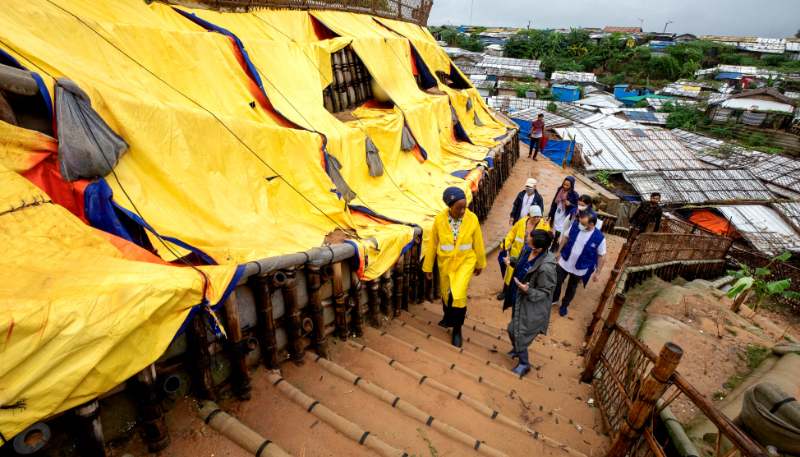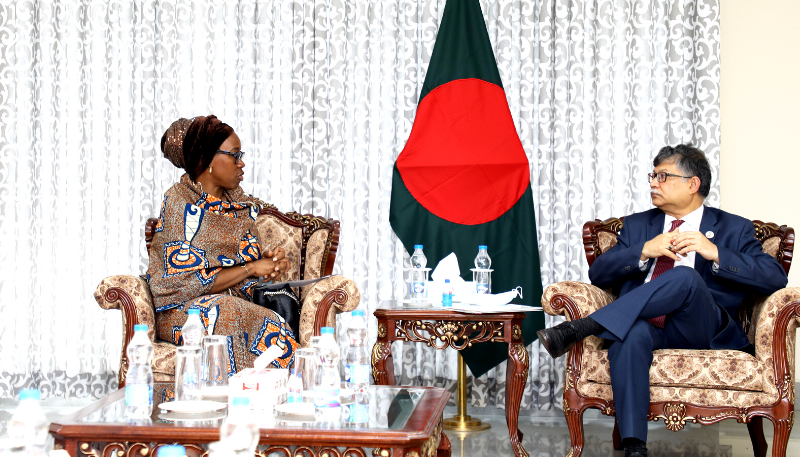
The International Organization for Migration (IOM) Deputy Director General (DDG) for the operation Ugochi Daniels praised Bangladesh for playing an exemplary role in migration management and tackling climate change.
Ugochi made this remark while concluding a five-day visit to Bangladesh from July 22 to July 26.
At the same time, she called for continuous support for the Rohingya and host communities.
"Bangladesh should be recognized for the important role they are playing by hosting more than 900,000 Rohingya," said Ugochi.
During this visit, she visited the world's largest refugee camp in Cox’s Bazar, which hosts more than 900,000 Rohingya.

The Rohingya community came here to Bangladesh five years ago fleeing the violence in Myanmar.
“As the Government of Bangladesh continues to provide humanitarian assistance and support to the Rohingya, help from the international community is crucial until the situation in Myanmar allows for Rohingya refugees to voluntarily return in a safe and dignified manner,” said DDG Daniels.
In Cox’s Bazar, IOM has been providing life-saving assistance, including shelter, health services, water and other emergency items to Rohingya since 2017.
While visiting Rohingya camps, she viewed environmentally friendly initiatives taken by the Bangladesh government such as sustainable solid waste management facilities, one of the world’s largest humanitarian solar-powered water supply systems and a cleaner energy provision system. All the projects were designed and implemented by IOM.
“The protracted nature of this crisis requires us to scale up the creative and innovative response to this unique situation. We need to continue to build the resilience of the refugees to ensure they live with dignity in the face of reduced humanitarian funding,” IMO deputy director general added.
Earlier this year, IOM issued an appeal for $139 million to support 1.4 million Rohingya and host community members in the country.
IOM in Bangladesh provides technical assistance to the Government in various areas of migration management to ensure safe, orderly, and regular migration. This includes support for improved migration governance, assistance to vulnerable migrants, immigration and border management, migration health, migration data and displacement tracking and humanitarian assistance.
In Dhaka, Ugochi met with the Ministry of Foreign Affairs Foreign Secretary (Senior Secretary) Masud Bin Momen, Ministry of Disaster Management and Relief State Minister Enamur Rahman, and Ministry of Expatriates’ Welfare and Overseas Employment Secretary Ahmed Munirus Saleheen among others were present.

She also attended a high-level policy dialogue on Human Mobility in the Context of Climate Change: Towards a Common Narrative and Action Pathway jointly organized by the Ministry of Foreign Affairs and IOM, where she met Bangladesh’s Foreign Minister, AK Abdul Momen, and Inter-Parliamentary Union President Saber Hossain Chowdhury.
During her discussions with government officials and international humanitarian and development practitioners, she advocated for greater efforts to jointly address climate change and human mobility at national, regional and global levels.
She highlighted that the World Bank estimate says that by 2050 one in every seven people in Bangladesh will have been displaced by climate change.